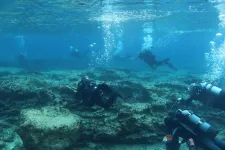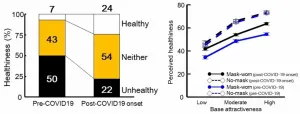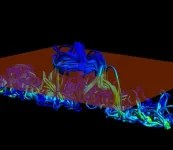(Press-News.org) Some antibiotics appear to be effective against a form of skin cancer known as melanoma. Researchers at KU Leuven, Belgium, examined the effect of these antibiotics on patient-derived tumours in mice. Their findings were published in the Journal of Experimental Medicine.
Researchers from KU Leuven may have found a new weapon in the fight against melanoma: antibiotics that target the 'power plants' of cancer cells. These antibiotics exploit a vulnerability that arises in tumour cells when they try to survive cancer therapy.
"As the cancer evolves, some melanoma cells may escape the treatment and stop proliferating to 'hide' from the immune system. These are the cells that have the potential to form a new tumour mass at a later stage" explains cancer researcher and RNA biologist Eleonora Leucci (KU Leuven). "In order to survive the cancer treatment however, those inactive cells need to keep their 'power plants' - the mitochondria - switched on at all times". As mitochondria derive from bacteria that, over time, started living inside cells, they are very vulnerable to a specific class of antibiotics. This is what gave us the idea to use these antibiotics as anti-melanoma agents."
The researchers implanted patient-derived tumours into mice, which were then treated with antibiotics - either as the only treatment or in combination with existing anti-melanoma therapies. Leucci: "The antibiotics quickly killed many cancer cells and could thus be used to buy the precious time needed for immunotherapy to kick in. In tumours that were no longer responding to targeted therapies, the antibiotics extended the lifespan of - and in some cases even cured - the mice."
The researchers worked with antibiotics that are now, because of rising antibiotic resistance, only rarely used in bacterial infection. However, this resistance has no effect on the efficacy of the treatment in this study, explains Leucci. "The cancer cells show high sensitivity to these antibiotics, so we can now look to repurpose them to treat cancer instead of bacterial infections."
However, patients with melanoma shouldn't start experimenting, warns Leucci. "Our findings are based on research in mice, so we don't know how effective this treatment is in human beings. Our study mentions only one human case where a melanoma patient received antibiotics to treat a bacterial infection, and this re-sensitised a resistant melanoma lesion to standard therapy. This result is cause for optimism, but we need more research and clinical studies to examine the use of antibiotics to treat cancer patients. Together with oncologist Oliver Bechter (KU Leuven/UZ Leuven), who is a co-author of this study, we are currently exploring our options."
INFORMATION:
This press release covers fundamental research. While this type of research may be the first step towards new treatments, the development process takes years. Therefore, a breakthrough in research is not the same as a breakthrough in medicine. If you have any questions or concerns about your health, please contact your local doctor for medical advice.
An international collaborative study led by University of Helsinki has conducted a holistic study to investigate the effects of COVID-19 restrictions on several air quality pollutants for the Po Valley region in northern Italy. The area is well known to have one of the worst air quality standards in Europe and is highly influenced by anthropogenic (human-led) activities. The study was done between research groups in Finland, Italy and Switzerland and the results were published in the journal Environmental Science: Atmospheres.
Scientists have combined air quality measurements and computer simulation data over several locations in the region. The resulting studies show that reduced emissions from traffic lead to a strong reduction of nitrogen ...
Targeted removals can be effective in suppressing the number of invasive lionfish found within protected coastlines around the Mediterranean Sea.
However, if they are to really be successful they need to be combined with better long-term monitoring by communities and conservationists to ensure their timing and location achieve the best results.
Those are the key findings of a new study, one of the first of its kind to examine the effectiveness of targeted lionfish removals from both an ecological and a socio-economic perspective.
Scientists working as part of the European Union-funded RELIONMED project ...
The Covid-19 pandemic has improved perceptions of facial attractiveness and healthiness of people wearing face masks in Japan.
Wearing sanitary facemasks was not uncommon in Japan prior to the Covid-19 pandemic. Public health initiatives during the pandemic have led to a drastic increase in the use of facemasks as they reduce the transmission of the SARS-CoV-2 virus. The sanitary-mask effect is a model that predicted how facemasks affected perceptions of facial attractiveness. However, as mindsets might have changed due to the pandemic, it is likely that the sanitary-mask effect has been altered.
A team of four scientists, including Professor Jun I. Kawahara from Hokkaido University's ...
Pregnant women in South East Asia are more likely to use smokeless tobacco than non-pregnant women, despite the added risk of foetal harm during pregnancy.
The study - from the University of York - also suggests that there is no difference in smoking between pregnant women and non-pregnant women in many lower to middle income countries.(LMICs)
Researchers analysed data from 42 lower to middle income countries (LMICs) and also conducted a separate sub-group analysis for the South East Asia Region. (SEAR)
Researchers said the study is the first to report comparative estimates of tobacco use among pregnant and non-pregnant women from the 42 LMICs encompassing 80,454 pregnant and 1,230,262 non-pregnant women.
Dr Radha ...
Results from a new survey of astronomers and geophysicists show that these sciences have a systemic bullying problem; one that is disproportionately worse for women and those from minority groups. In a survey carried out by the Royal Astronomical Society (RAS) last year of over 650 people in the field, 44% of respondents had suffered bullying and harassment in the workplace within the preceding 12 months. Aine O'Brien, RAS Diversity Officer, will present the key results in a talk at the virtual National Astronomy Meeting on Thursday 22 July.
Key initial findings show:
Disabled, and Black and minority ethnic astronomers and geophysicists are 40% more likely to be bullied than their non-disabled and White colleagues respectively.
Women and non-binary people in the field are 50% more ...
Remote 24-hour monitoring for cancer patients receiving chemotherapy helps to better manage side effects and improve quality of life, finds a study published by The BMJ today.
The researchers say remote monitoring can provide a safe, secure, and "real time" system that optimises symptom management and supports patients to remain at home - and is particularly relevant in the context of the covid-19 pandemic.
Effective symptom monitoring and management is essential during chemotherapy for cancer, but current approaches rely on patients recognising that symptoms are severe ...
Two years on from its pledge to make England smoke free by 2030, the UK government has failed to deliver on the policies it promised to deliver this ambition, say a group of leading doctors, professional bodies and charities in The BMJ today.
In an open letter to the Prime Minister and Secretary of State for health, they say smoking is likely to have killed more people last year than covid-19 and it will carry on doing so for many years to come unless the government takes action.
They call for a US-style 'polluter pays' levy on tobacco manufacturers to fund the strategy, saying "the time has come to make the tobacco manufacturers pay to end the epidemic they and they alone have caused."
The rate of decline in smoking in the years leading up to 2019 was not sufficient to deliver ...
A new approach to analysing the development of magnetic tangles on the Sun has led to a breakthrough in a longstanding debate about how solar energy is injected into the solar atmosphere before being released into space, causing space weather events. The first direct evidence that field lines become knotted before they emerge at the visible surface of the Sun has implications for our ability to predict the behaviour of active regions and the nature of the solar interior. Dr Christopher Prior of the Department of Mathematical Sciences, Durham University, will present the work today at the ...
A new study by investigators from Brigham and Women's Hospital examined the relationship between active lifestyles and the risk of obstructive sleep apnea (OSA). The study followed around 130,000 men and women in the United States over a follow-up period of 10-to-18 years and found that higher levels of physical activity and lower levels of sedentary behavior were associated with a lower risk of OSA. Their results are published in the European Respiratory Journal.
"In our study, higher levels of physical activity and fewer hours of TV watching, and sitting either at work or away from home ...
Not enough progress has been made to address physical inactivity worldwide, with adolescents and people living with disabilities (PLWD) among the least likely populations to have the support needed to meet the World Health Organization (WHO)'s physical activity guidelines. Global efforts to improve physical activity have stalled, with overall deaths caused by physical activity remaining at more than 5 million people per year. [1]
Physical inactivity is linked to an increased risk of non-communicable diseases (NCDs) such as heart disease, diabetes, and some cancers and costs at least $54 billion per year in direct health care costs of which $31 billion is paid by the public sector. The slow progress to improve physical activity worldwide ...


